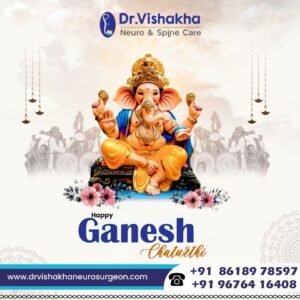Back pain is one of the most common health problems today, affecting people of all ages and lifestyles. From long hours of sitting at a desk to injuries, poor posture, or age-related changes, the reasons can vary widely. But when back pain becomes persistent, severe, or starts interfering with daily life, it may be time to consult a specialist.
In Hyderabad, Dr. Vishakha, a leading neurosurgeon, is known for her expertise in diagnosing and treating back pain caused by spine and nerve-related conditions.
Why Back Pain Needs Expert Care
- Not all back pain is the same. Sometimes it is due to muscle strain, but in other cases, it may be linked to conditions such as:
- Herniated or slipped disc
- Sciatica (nerve compression)
- Spinal stenosis (narrowing of the spinal canal)
- Degenerative disc disease
- Spinal injuries
- Tumours or other neurological causes
- Conditions That Can Cause Back Pain
- Herniated or Slipped Disc
Between the bones of the spine (vertebrae) are soft cushions called discs that act as shock absorbers. Sometimes, the inner gel-like material of a disc pushes out through a tear in the outer layer. This is called a herniated or slipped disc. It can press on nearby nerves, leading to back pain, numbness, or pain radiating to the arms or legs.
- Sciatica (Nerve Compression)
Sciatica happens when the sciatic nerve—the longest nerve in the body—is compressed, usually by a slipped disc, bone spur, or spinal narrowing. It causes sharp, shooting pain that starts in the lower back and travels down one leg. Tingling, burning, or weakness may also occur.
- Spinal Stenosis (Narrowing of the Spinal Canal)
The spinal canal is the passageway that protects the spinal cord and nerves. In spinal stenosis, this canal becomes narrower, often due to ageing or arthritis. The pressure on the nerves can cause pain, tingling, or weakness in the back, legs, or arms, especially while walking or standing.
- Degenerative Disc Disease
As we age, the discs in our spine gradually lose water content and elasticity. This wear and tear is called degenerative disc disease. It can cause stiffness, chronic pain, and sometimes nerve compression if the disc space reduces significantly.
- Spinal Injuries
Accidents, falls, or sports injuries can damage the bones (vertebrae), discs, or ligaments in the spine. Depending on the severity, spinal injuries may cause mild pain, fractures, or even nerve damage that leads to weakness or loss of sensation.
- Tumours or Other Neurological Causes
In rare cases, tumours (either benign or cancerous) can develop in or around the spinal cord, causing pressure on nerves and leading to back pain. Other neurological conditions, such as infections or inflammatory disorders, can also affect the spine and nerves.
A neurosurgeon like Dr. Vishakha specialises in identifying whether the pain is musculoskeletal or nerve-related, ensuring patients get the right treatment.
Dr. Vishakha’s Approach to Back Pain
- Detailed Diagnosis
- Dr. Vishakha begins with a thorough evaluation, including:
- Clinical examination
- Medical history review
- Advanced imaging (MRI, CT scans, X-rays) if required
This step helps pinpoint the root cause of pain rather than just treating symptoms.
- Non-Surgical Treatment Options
- Surgery is not always the first choice. Dr. Vishakha often recommends:
- Medications for pain relief and inflammation
- Physiotherapy and posture correction exercises
- Lifestyle modifications (ergonomics, weight management)
- Minimally invasive pain management techniques
- Minimally Invasive Spine Surgery (if required)
When conservative treatments fail, Dr. Vishakha offers advanced surgical solutions, often using minimally invasive techniques. These methods involve smaller incisions, faster recovery, and less post-surgical pain compared to traditional open surgery.
- Comprehensive Post-Treatment Care
Recovery doesn’t end with treatment. Dr. Vishakha provides personalised rehabilitation guidance, ensuring long-term relief and prevention of recurrence.
When Should You See a Neurosurgeon for Back Pain?
- You should consider consulting Dr. Vishakha if you experience:
- Severe pain lasting more than a few weeks
- Pain radiating to legs or arms (sciatica-like symptoms)
- Numbness, tingling, or weakness
- Difficulty walking or performing daily tasks
- Loss of bladder or bowel control (medical emergency)
Conclusion
Back pain can affect your quality of life, but with expert care from Dr. Vishakha, a Neurosurgeon in Hyderabad, patients can find relief and regain mobility. Whether it’s conservative care, minimally invasive procedures, or advanced spine surgery, Dr. Vishakha’s patient-centric approach ensures the best outcomes.
About Dr Vishakha :
Dr Vishakha Basavraj Karpe is a highly skilled senior consultant at Rainbow Children’s Hospital in Banjara Hills and Hyder Nagar Hyderabad. She is known for her comprehensive care approach and is one of the few dedicated leading neurosurgeons in the city and India with over ten years of extensive experience in pediatric neurosurgery. Her expertise includes treating hydrocephalus, spinal dysraphism, craniosynostosis, paediatric brain infections, brain and spine tumours and stroke surgery. She has a special interest in craniosynostosis surgery, which is done only in very few centres in India.





